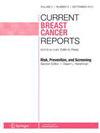乳腺癌新辅助治疗后的放疗管理
IF 0.9
Q4 ONCOLOGY
引用次数: 0
摘要
新辅助化疗(NAC)的应用是乳腺癌治疗的重要组成部分。最近的进展对NAC后放疗的最佳作用提出了质疑,因为许多放射研究是在没有NAC的情况下进行的。本综述旨在了解NAC术后放疗相关的现有数据、悬而未决的问题和正在进行的试验。对NAC的反应与有希望的临床结果相关,特别是在三阴性和HER2+乳腺癌中。回顾性数据表明,根据肿瘤对NAC的反应调整放疗可能是适当的,但在没有前瞻性随机证据的情况下,建议谨慎。NSABP B-51和Alliance A011202将研究这种情况下淋巴结疾病的管理。未来的试验将检验最佳的治疗顺序。基于对新辅助化疗反应的个性化辅助放疗是一个有吸引力的目标,目前正在多个临床试验中进行评估,包括NSABP B-51。本文章由计算机程序翻译,如有差异,请以英文原文为准。
Radiation Management for Breast Cancer After Neoadjuvant Therapy
Abstract Purpose of Review Neoadjuvant chemotherapy (NAC) utilization is an important part of breast cancer therapy. Recent advances call into question the optimal role of radiotherapy after NAC, as many radiation studies were performed without NAC. This review was conducted to understand the current data, outstanding questions and ongoing trials related to radiotherapy after NAC. Recent Findings Response to NAC is associated with promising clinical outcomes, particularly in triple-negative and HER2+ breast cancer. Retrospective data suggest that modification of radiotherapy based on tumor response to NAC may be appropriate, though caution is advised without prospective randomized evidence. NSABP B-51 and Alliance A011202 will investigate the management of nodal disease in this setting. Future trials will examine the optimal sequencing of treatments. Summary The personalization of adjuvant radiotherapy based on response to neoadjuvant chemotherapy is an attractive goal that is currently being evaluated in multiple clinical trials, including NSABP B-51.
求助全文
通过发布文献求助,成功后即可免费获取论文全文。
去求助
来源期刊

Current Breast Cancer Reports
ONCOLOGY-
CiteScore
1.60
自引率
0.00%
发文量
24
期刊介绍:
This journal aims to review the most important, recently published clinical findings related to the diagnosis, treatment, management, and prevention of breast cancer. By providing clear, insightful, balanced contributions by international experts, the journal intends to serve all those involved in the care of those with the disease. We accomplish this aim by appointing international authorities to serve as Section Editors in key subject areas, such as prevention, systemic therapy, and translational research. Section Editors, in turn, select topics for which leading experts contribute comprehensive review articles that emphasize new developments and recently published papers of major importance, highlighted by annotated reference lists. An international Editorial Board reviews the annual table of contents, suggests articles of special interest to their country/region, and ensures that topics are current and include emerging research. Commentaries from well-known figures in the field are also provided.
 求助内容:
求助内容: 应助结果提醒方式:
应助结果提醒方式:


